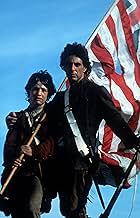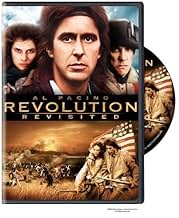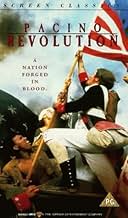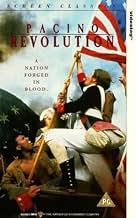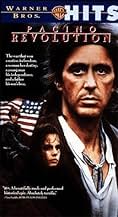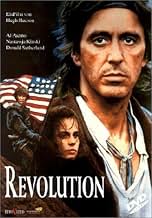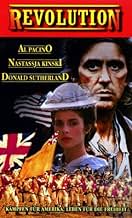VALUTAZIONE IMDb
5,3/10
7962
LA TUA VALUTAZIONE
Tom Dobb sbarca a New York e subito si imbatte nel fervore popolare per la lotta di indipendenza dagli inglesi. Grazie all'attivista Daisy, Tom si schiera con i ribelli patrioti per la causa... Leggi tuttoTom Dobb sbarca a New York e subito si imbatte nel fervore popolare per la lotta di indipendenza dagli inglesi. Grazie all'attivista Daisy, Tom si schiera con i ribelli patrioti per la causa della rivoluzione.Tom Dobb sbarca a New York e subito si imbatte nel fervore popolare per la lotta di indipendenza dagli inglesi. Grazie all'attivista Daisy, Tom si schiera con i ribelli patrioti per la causa della rivoluzione.
- Regia
- Sceneggiatura
- Star
- Premi
- 1 vittoria e 4 candidature totali
Cheryl Anne Miller
- Cuffy
- (as Cheryl Miller)
Recensioni in evidenza
I had wanted to see this movie for quite some time, but for some strange reason it never appeared on television despite its cast. However, I finally managed to find a copy of it at a specialized video store in my city. (The version I found was the director's cut.) So what did I think of it? Well, I admit that the look of the movie is very convincing. The costumes, props, and set decoration look fantastic. It really seems that they captured what the colonies were like more than 200 years ago.
However, the story and characters are less convincing. For example, the movie seems to suggest that most Americans were pro-revolution. In actual fact, a third were pro-revolution, another third were British loyalists, and the remaining third either didn't care or were undecided. Another odd fact is that the movie portrays just about all of the pro- revolutionists as despicable - odd because the filmmakers were trying to sell this movie to the American public! Actually, most of the other characters in the movie, like the British soldiers, are also shown in a negative light. There are precious few characters in the movie to care about. The actors try, but a lot of the roles are shallow. Donald Sutherland and Nastassja Kinski have little to do despite their billing.
There are other problems in the movie I could go on for some time listing, like Pacino's extensive yet completely unnecessary narration. Still, I will admit that while I didn't like the movie, I wasn't bored at any moment. There's plenty of eye candy, and I confess a curiosity as to how Pacino's character would end up. The movie isn't as bad as some critics have claimed... though I won't hesitate to add that it wasn't worth the years I searched for a way to see it.
However, the story and characters are less convincing. For example, the movie seems to suggest that most Americans were pro-revolution. In actual fact, a third were pro-revolution, another third were British loyalists, and the remaining third either didn't care or were undecided. Another odd fact is that the movie portrays just about all of the pro- revolutionists as despicable - odd because the filmmakers were trying to sell this movie to the American public! Actually, most of the other characters in the movie, like the British soldiers, are also shown in a negative light. There are precious few characters in the movie to care about. The actors try, but a lot of the roles are shallow. Donald Sutherland and Nastassja Kinski have little to do despite their billing.
There are other problems in the movie I could go on for some time listing, like Pacino's extensive yet completely unnecessary narration. Still, I will admit that while I didn't like the movie, I wasn't bored at any moment. There's plenty of eye candy, and I confess a curiosity as to how Pacino's character would end up. The movie isn't as bad as some critics have claimed... though I won't hesitate to add that it wasn't worth the years I searched for a way to see it.
Sort of both a proto-PATRIOT (though mildly less-addlebrained) with reverse-elements of LAST OF THE MOHICANS (the Huron are the good guys this time around), this film covers the criminally underrepresented ground of the American Revolutionary War in a generally hackneyed way. I did like the recurrence of some elements in the film, such as how it was really "about" bonding with and protecting sons and how the careers of protagonist Pacino contrasted with oddly-cast British antagonist Sutherland. The two characters feel cartoonish at times as Sutherland carries out several heartless atrocities, exemplifying the un-nuanced way British are often depicted as villains, but he also impressively comes off like an honorable human being at the same time.
There's about as many baffling decisions on display as there are surprisingly good ones. What barely qualifies as a "love story" between Pacino and Kinski never makes sense and it's never clear why bougie but idealistic Kinski gets so enthralled with apathetic commoner Pacino. All of Kinski's scenes slow the film down along with many irritating scenes of Pacino getting wronged and stolen from left-and-right with him usually responding by angrily shouting at someone. The actual battle scenes come off very stiff and awkward, though to be fair that was generally the fighting style of the time.
I do give the film credit for actually recasting one of the characters as he ages instead of relying on goofy makeup or prosthetics. I also give it credit for the ending holding back on the most obvious way of concluding the narrative and reminding us that the characters in the film actually are supposed to be human beings. It is a bit baffling though that since the film was made in Europe with so much British money that they went with Donald Sutherland as the villain with a distracting accent. They could easily have cast any number of local British character actors of the day (say someone ike Anthony Hopkins, Paul Darrow, John Hurt, etc and the film would have been 50% better.
A good looking film with a couple nice surprises and believable production design, but unfortunately weighed down with too many flaws and pacing issues.
There's about as many baffling decisions on display as there are surprisingly good ones. What barely qualifies as a "love story" between Pacino and Kinski never makes sense and it's never clear why bougie but idealistic Kinski gets so enthralled with apathetic commoner Pacino. All of Kinski's scenes slow the film down along with many irritating scenes of Pacino getting wronged and stolen from left-and-right with him usually responding by angrily shouting at someone. The actual battle scenes come off very stiff and awkward, though to be fair that was generally the fighting style of the time.
I do give the film credit for actually recasting one of the characters as he ages instead of relying on goofy makeup or prosthetics. I also give it credit for the ending holding back on the most obvious way of concluding the narrative and reminding us that the characters in the film actually are supposed to be human beings. It is a bit baffling though that since the film was made in Europe with so much British money that they went with Donald Sutherland as the villain with a distracting accent. They could easily have cast any number of local British character actors of the day (say someone ike Anthony Hopkins, Paul Darrow, John Hurt, etc and the film would have been 50% better.
A good looking film with a couple nice surprises and believable production design, but unfortunately weighed down with too many flaws and pacing issues.
As a high school US History teacher I often use a few scenes from this film in my classes. I have found value in some elements of this dark, brooding, and sluggish film and think it deserves some credit. Examples are: NY City in the opening and closing scenes, (they are our history books brought to life). The battles of NY, specifically Long Island and Brooklyn Heights (the film is vague as to which exact battle this is) the complicated world of Nastasia Kinski's character Daisy, daughter of loyalists, mother yes, but which side is her father really on? Additionally, the miserable conditions at Valley Forge, and very importantly, Tom and Ned "quitting" the war after their first battle (Historically Washington's "grand army" melted away by the autumn of 1776). As a teacher I love the resource of this film. As a parent I want my children to be exposed, As a period movie fan I don't love this film very much.
This movie has consistantly been trashed by numerous professional and amateur reviewers alike. Even Leonard Maltin, my personal favorite movie guy, rated it a "BOMB". I can`t understand why. Although it isn`t a perfect film endeavor, it does tell a story that`s never been told before...but obviously in a manner that many found extremely annoying at best. Aside from New York and L.A. movie houses, I don`t believe this film was released nationally at any time. Personally, I thought it was a very different type of movie, but effective and entertaining in a strange way. It gave me a feel for the time period, including an appealing atmospheric identity. Being an ex-NewYorker and exposed to the famous Revolutionary battlefields, that still exist throughout the metro area, I felt an aura of actually being present in that time period, with events occuring on both surrealistic and realistic levels. Al Pacino is a born/raised New Yorker and I believe captured the essence of his character very well. Pacino gave a solid portrayal of an 18th. century individual caught up in a violent period of American history. This movie has been unfairly criticized and overly maligned in my humble opinion. A unique film deserving of more praise then it has been awarded. See it for yourself.
--------------------------------------------------------------------------- -----
--------------------------------------------------------------------------- -----
After the Academy Awards, the most important awards ceremony is the Golden Raspberries (known as "Razzies") – the "worst of" counterpart to the Oscars. The thing about the Razzies is that they don't go for the literal worst movies of the year – otherwise they would give prizes to a load of trashy B-movies. Instead they bestow their honours upon the high profile flops, the movies that could have been so much more, the casts and crews who should have known better. Revolution stars Al Pacino, one of the greatest actors of his generation, and was directed by Hugh Hudson, he of 1981 Best Picture Chariots of Fire. And yet, in a stark "Oh how the mighty have fallen" scenario, it recouped less than two percent of its budget at the box office and was nominated for four Golden Raspberries.
Revolution is not without promise. In contrast to the usual gung-ho attitude of pictures on this subject (cf. The Patriot), this takes an approach rare in historical pictures on any era, showing not the makers and shapers of change, but those unwillingly caught up in it. The Robert Dillon screenplay still ultimately comes down on the side of the revolutionaries, but it shows the conflict with the minimum of political emotiveness, and a storyline whose occasional poignancy comes from its even-handed intimacy. Director Hudson has excelled in creating tableaux that are full of believable bustle and period dirt, even if they were entirely shot in rainy England. There's a realistic melange of accents to be heard here; not just clipped British and broad American, which didn't really exist in any recognisable form at the time anyway. The credibility of some of the bit parts is very effective, such as the bolshy soldier who prods Pacino when he's chosen for the fox hunt, a slappable face if ever there was one.
And yet the movie's the biggest flaws are on the same grounds. There are some woefully unrealistic and downright silly characterisations here. Chief among these is Nastassja Kinski's. While no means badly acted (in fact she does very well all things considered), the character as written is in no way believable. Not that you can't have rebellious and resourceful women, but stabbing a man in the nadgers at a soirée is a bit hard to swallow. It would probably have warranted her a stint in an asylum, and certainly more than just a telling off from her mother. And giving the Englishman in question a stupid nasal voice and cartoonish demeanour was a huge mistake. It all seems totally at odds with the realism elsewhere in the movie. There are problems too with the over-earnest attempt at a documentary look. Hudson's constant use of hand-held camera quickly becomes tiresome. Pacino's performance is heartfelt but there are times when he appears to break into improvisation yet comes across too much as the modern New Yorker.
In response to its poor reception, Hudson would later revisit the material for a 2009 special edition appropriately titled Revolution Revisited, and it is this version of the movie which I have seen. Apparently around ten minutes of footage was shorn off (I don't know what this was so can't comment), and they added narration by Pacino, written and recorded ad hoc. This latter was to my mind a mistake – it adds nothing, basically spelling out the character's thoughts at any given moment, even though the essence of them is already there on the screen. It somewhat spoils the taciturn moodiness of the character, as well as the chaotic wordlessness of some scenes. It's nice however to be able to enjoy a decent new transfer of the picture, because it really isn't as bad as its reputation (and those Razzie nominations, all of which it lost to Rambo II, I hasten to add) would suggest. It is incredibly moving at times, a high point being Pacino's desperate comforting of Ned as his foot wound is cauterized. It's also beautifully shot. This is ultimately a movie of two sides – the very good and the very bad, with no middle ground of mediocrity. And this is very frustrating, because you can see just how easily it could have been a masterpiece.
Revolution is not without promise. In contrast to the usual gung-ho attitude of pictures on this subject (cf. The Patriot), this takes an approach rare in historical pictures on any era, showing not the makers and shapers of change, but those unwillingly caught up in it. The Robert Dillon screenplay still ultimately comes down on the side of the revolutionaries, but it shows the conflict with the minimum of political emotiveness, and a storyline whose occasional poignancy comes from its even-handed intimacy. Director Hudson has excelled in creating tableaux that are full of believable bustle and period dirt, even if they were entirely shot in rainy England. There's a realistic melange of accents to be heard here; not just clipped British and broad American, which didn't really exist in any recognisable form at the time anyway. The credibility of some of the bit parts is very effective, such as the bolshy soldier who prods Pacino when he's chosen for the fox hunt, a slappable face if ever there was one.
And yet the movie's the biggest flaws are on the same grounds. There are some woefully unrealistic and downright silly characterisations here. Chief among these is Nastassja Kinski's. While no means badly acted (in fact she does very well all things considered), the character as written is in no way believable. Not that you can't have rebellious and resourceful women, but stabbing a man in the nadgers at a soirée is a bit hard to swallow. It would probably have warranted her a stint in an asylum, and certainly more than just a telling off from her mother. And giving the Englishman in question a stupid nasal voice and cartoonish demeanour was a huge mistake. It all seems totally at odds with the realism elsewhere in the movie. There are problems too with the over-earnest attempt at a documentary look. Hudson's constant use of hand-held camera quickly becomes tiresome. Pacino's performance is heartfelt but there are times when he appears to break into improvisation yet comes across too much as the modern New Yorker.
In response to its poor reception, Hudson would later revisit the material for a 2009 special edition appropriately titled Revolution Revisited, and it is this version of the movie which I have seen. Apparently around ten minutes of footage was shorn off (I don't know what this was so can't comment), and they added narration by Pacino, written and recorded ad hoc. This latter was to my mind a mistake – it adds nothing, basically spelling out the character's thoughts at any given moment, even though the essence of them is already there on the screen. It somewhat spoils the taciturn moodiness of the character, as well as the chaotic wordlessness of some scenes. It's nice however to be able to enjoy a decent new transfer of the picture, because it really isn't as bad as its reputation (and those Razzie nominations, all of which it lost to Rambo II, I hasten to add) would suggest. It is incredibly moving at times, a high point being Pacino's desperate comforting of Ned as his foot wound is cauterized. It's also beautifully shot. This is ultimately a movie of two sides – the very good and the very bad, with no middle ground of mediocrity. And this is very frustrating, because you can see just how easily it could have been a masterpiece.
Lo sapevi?
- QuizWhen Annie Lennox's character sings a song near the end of the movie, her voice is dubbed.
- BlooperIn battle, the British soldiers are depicted taking short steps; in reality, Redcoats were trained to take long paces, so as to close the range quickly.
- Versioni alternativeIn 2009, Hugh Hudson made his own director's cut titled "Revolution Revisited" which was also released on DVD. The new version featured new narration recorded by Al Pacino, a different ending, and removed 10 minutes of footage from the film.
- ConnessioniEdited into Give Me Your Answer True (1987)
I più visti
Accedi per valutare e creare un elenco di titoli salvati per ottenere consigli personalizzati
- How long is Revolution?Powered by Alexa
Dettagli
- Data di uscita
- Paesi di origine
- Lingua
- Celebre anche come
- Revolution 1776
- Luoghi delle riprese
- King's Lynn, Norfolk, Inghilterra, Regno Unito(New York scenes)
- Aziende produttrici
- Vedi altri crediti dell’azienda su IMDbPro
Botteghino
- Budget
- 28.000.000 USD (previsto)
- Lordo Stati Uniti e Canada
- 358.574 USD
- Fine settimana di apertura Stati Uniti e Canada
- 52.755 USD
- 29 dic 1985
- Lordo in tutto il mondo
- 358.574 USD
- Tempo di esecuzione
- 2h 6min(126 min)
- Colore
- Proporzioni
- 2.35 : 1
Contribuisci a questa pagina
Suggerisci una modifica o aggiungi i contenuti mancanti


